Pope Francis is visiting Canada July 25-29, making stops in Edmonton, Quebec City and Iqaluit to address the devastating legacy of Canada’s residential school system.
Follow Tuesday’s live coverage of the Pope’s visit.
Here’s what you need to know so far:
- Thousands of residential school survivors and their families gathered in Maskwacis.
- ‘I am sorry. I ask for forgiveness’: Pope Francis apologizes for the abuses of residential schools.
- Pope Francis met with Indigenous people and the parish community of Sacred Heart Church of the First Peoples in Edmonton.
8:15 p.m. ET
Pope Francis leaves Sacred Heart, greets devotees waiting outside
Pope Francis, while being pushed in a wheelchair, approached awaiting devotees outside Sacred Heart Church of the First Peoples. Marek Keyrose, 19, was among those waiting for a glimpse of the Pope. “I was able to see the guy that literally made my culture,” the first-generation Canadian said. His family is from Ecuador, and he noted the Pope is from Argentina. “Oh my God, that was amazing.”
The Pope then got in a vehicle and left in a motorcade, waving and smiling to the cheering crowd.
– Carrie Tait
8 p. ET
Pope Francis address Sacred Heart Church; receives gifts from children and elders
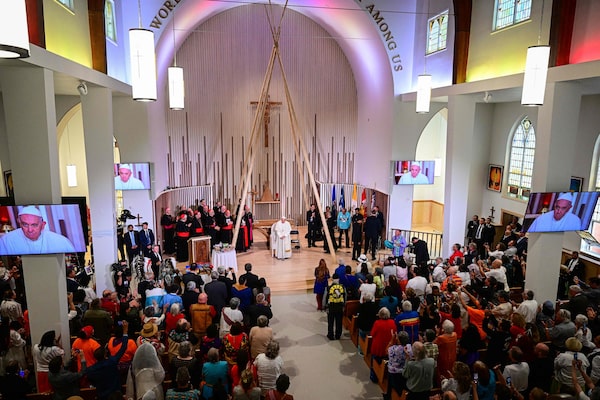
Pope Francis arrives at the Sacred Heart Church of the First Peoples to meet with members of the Indigenous community in Edmonton, Alberta, Canada, on July 25, 2022. - Pope Francis on Monday apologized for the "evil" inflicted on the Indigenous peoples of Canada on the first day of a visit focused on addressing decades of abuse committed at Catholic institutions. (Photo by Vincenzo PINTO / AFP) (Photo by VINCENZO PINTO/AFP via Getty Images)VINCENZO PINTO/AFP/Getty Images
At Sacred Heart, Pope Francis addressed about 200 people in Spanish, reiterating his apology made hours earlier at Maskwacis. The congregation consisted largely, although not exclusively, of Indigenous peoples.
”It pains me to think that Catholics contributed to policies of assimilation and enfranchisement that inculcated a sense of inferiority, robbing communities and individuals of their cultural and spiritual identity, severing their roots and fostering prejudicial and discriminatory attitudes; and that this was also done in the name of an educational system that was supposedly Christian,” the Holy Father said, according to the English text distributed by the Vatican.
Tanya Talaga: Pope Francis’s apology was heartfelt and historic. But it left us wanting more
The Pope acknowledged reconciliation is not easy for those who suffered under the residential school system. ”I can only imagine the effort it must take, for those who have suffered so greatly because of men and women who should have set an example of Christian living, even to think about reconciliation,” he said, according to the English text. “Nothing can ever take away the violation of dignity, the experience of evil, the betrayal of trust. Or take away our own shame, as believers.”
Despite this struggle, the Pope said “we need to set out anew.”
He added: “This is the way forward: to look together to Christ, to love betrayed and crucified for our sake; to look to Christ, crucified in the many students of the residential schools.”
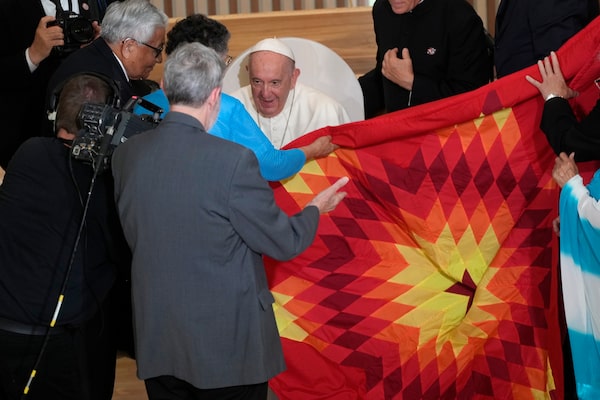
Pope Francis meets Indigenous people and members of the parish community of Sacred Heart in Edmonton, Canada, Monday, July 25, 2022.Gregorio Borgia/The Associated Press
After Pope Francis spoke, children presented him with gifts, such as art from Indigenous artist Jason Carter. Elders presented him with a red, yellow, and orange star blanket. Traditionally, this would be draped on the receivers’ shoulders; in this case, it was placed on his lap because of his mobility issues. The congregation cheered when it was placed on his lap.
Leaning heavily on his cane with his right hand, the Pope then stood and offered a blessing to the newly renovated church. He then returned to his wheelchair at centre stage, smiled and waved with both hands.
- Carrie Tait
6:50 p.m. ET
A survivor prepares for the Pope’s visit at Sacred Heart Church
Some Christians believe that a church is entered in the spirit of forgiveness. So it is with Noella Amable, who was waiting patiently for the arrival of Pope Francis to Edmonton’s Sacred Heart Church of the First Peoples on Monday afternoon.
The church, built in 1913 on Treaty 6 territory, is bright, airy and decorated with Indigenous art after it was damaged by fire two years ago; the tabernacle is the shape of a tipi.
Ms. Amable, who was born in Onion Lake, Sask., attended Christian day schools, not overnight residential schools, in her youth; she was hit by the nuns, though not sexually abused. But she felt her culture was taken away from her. “We couldn’t talk our language and they cut our hair short,” she said. “I think they wanted us to look like non-Indian little girls.”
Her mother was in a residential school and had a miserable time there. “She couldn’t cope after she left and she ended up on the streets of Edmonton,” Ms. Amable said.
But she said she did not come to Sacred Heart to condemn the church, or Pope Francis. “I heard his apology this morning and it was very moving for me,” she said. “My mother taught us to forgive the nuns. I had to, I had to move on. Francis did say he was sorry and we have to take that to heart. How many times can someone say they are sorry?”
- Eric Reguly
6:45 p.m. ET
Pope Francis arrives at Sacred Heart Catholic Church of the First Peoples in Edmonton
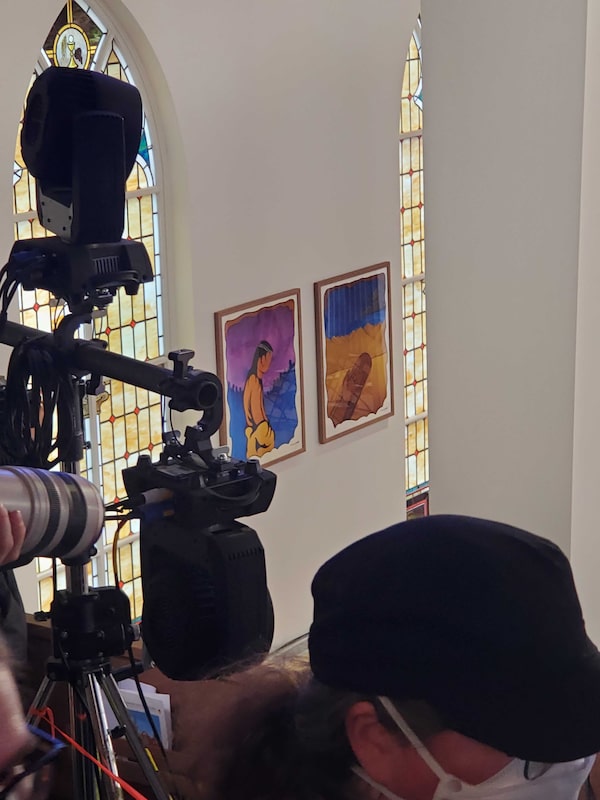
Stations of the Cross paintings hang in Sacred Heart Church. The paintings, by artist Sheldon Meek, were lost as a result of a fire in August, 2020 and recreated for the church's renovation. Children will present Pope Francis with prints of the works.
About 200 people gathered in Sacred Heart Catholic Church of the First Peoples in downtown Edmonton Monday afternoon. The church was smudged ahead of the Pope’s arrival. Singing and drumming started as his motorcade approached.
Members of the parish Indigenous Music Ministry will offer an honour song, the traditional hymn How Great Thou Art in Cree, according to the papal itinerary. This demonstrates to someone new or visiting that they are welcome and appreciated. The church’s Catholic Fathers, and Elder Fernie Marty, will greet the Pope.
Sheldon Meek painted the Stations of the Cross in Sacred Heart. They were lost as a result of a fire and renovations. However, they were recreated for the renovated church. Children will present the Pope with prints of the work. The Pope will also receive an eagle feather and a star quilt.
- Carrie Tait
5:45 p.m. ET
Apology must be ‘the beginning and not the end,’ says Crown-Indigenous Relations Minister
Minister of Crown-Indigenous Relations Marc Miller says the Pope’s apology to Indigenous people must be “the beginning and not the end.”
He says more work must be done, including getting documents from the Catholic Church, so survivors get an element of closure and a complete picture of the residential school system.
Miller says the federal government does play a role.
- The Canadian Press
2:00 p.m. ET
Pope Francis leaves Maskwacis; to visit Sacred Heart later today
Pope Francis is leaving Maskwacis after giving a formal apology for residential schools. The pontiff spent about 90 minutes in the Indigenous community south of Edmonton.
He is set to speak later today with Indigenous Peoples and parish members at the Church of Sacred Heart in Edmonton.
The Vatican bills Pope Francis’s stop at Sacred Heart as an “encounter,” which, in the parlance of the church, indicates a deeper, more intimate connection than a formal meeting or visit. It is anchored in outpouring and listening, a theme dear to Pope Francis.
– The Canadian Press and Carrie Tait
1:40 p.m. ET
Jerry Saddleback performs honour song; Chief Littlechild presents Pope with a traditional headdress
An honour song by Jerry Saddleback followed the formal apology as Chief Wilton Littlechild, who suffers from health ailments, walked shakily up the steps to present Pope Francis with a traditional headdress, similar to the one worn by the chiefs who surrounded him on stage.
A headdress is placed on the head of Pope Francis following his apology for the residential school system at Maskwacis on July 25, 2022.Gavin John/The Globe and Mail
The crowd applauded as Chief Littlechild, a former Truth and Reconciliation commissioner, placed the traditional and sacred item on the Pope’s head.
Sipihko, A Cree woman, weeps after she finished singing Oh Canada in Cree to Pope Francis at Maskwacis on July 25, 2022.Gavin John/The Globe and Mail
Sipihko, a Cree woman in regalia cried out, singing the national anthem in her Indigenous language, through tears. The crowd applauded the unscripted, emotional moment. Shortly after, someone cried out, “Repudiate the Doctrine of Discovery! Renounce the papal bulls!”
The papal bulls were 15th-century edicts that justified taking Indigenous land, and many Indigenous leaders have called on the pope to formally rescind them.
– Willow Fiddler
1:10 p.m. ET
Pope Francis apologizes for the abuses of residential schools
Pope Francis apologized Monday for the Catholic Church’s role in the abuse at residential schools in Canada. Speaking through a translator, the Pope said that while there were “many instances of devotion and care for children,” the overall effects of residential school policies were “catastrophic.”
The Globe and Mail
“I am sorry. I ask for forgiveness, in particular, for the ways in which many members of the Church and of religious communities co-operated, not least through their indifference, in projects of cultural destruction and forced assimilation promoted by the governments of that time, which culminated in the system of residential schools,” Pope Francis said at an outdoor gathering near the former site of the Ermineskin Indian Residential School, once one of the largest residential schools.
Pope Francis said that though Christian charity “was not absent” and that there were “many instances of devotion and care for children,” the overall effects of residential school policies were “catastrophic.”
Read Pope Francis’s full apology to Indigenous peoples for harms of residential schools
“I humbly beg forgiveness for the evil committed by so many Christians against the Indigenous peoples,” he said.
The policies were a “disastrous error” incompatible with the gospel of Jesus Christ, he said, adding that Indigenous peoples continue to pay the price.
Near the end of his speech, the Pope called for a “serious investigation of what took place in the past and to assist the survivors of the residential schools to experience healing from the traumas they suffered.” The pontiff spoke in Spanish, his first language, with English translations provided by the Holy See press office.
Translations were also available in several Indigenous languages.
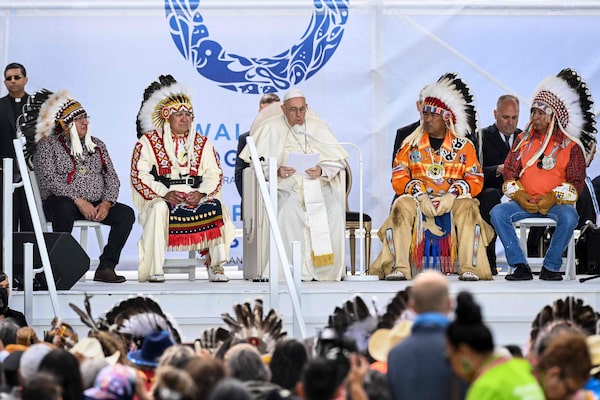
Pope Francis speaks to members of the Indigenous community at Muskwa Park in Maskwacis, Alberta, Canada, on July 25, 2022. - Pope Francis will make a historic personal apology Monday to Indigenous survivors of child abuse committed over decades at Catholic-run institutions in Canada, at the start of a week-long visit he has described as a "penitential journey." (Photo by Patrick T. FALLON / AFP) (Photo by PATRICK T. FALLON/AFP via Getty Images)PATRICK T. FALLON/AFP/Getty Images
The text appears to ask for a new probe into the residential schools even though their abuses were thoroughly examined by the Truth and Reconciliation Commission, which did its work between 2008 and 2015. The Holy See press office provided no other details about what this “serious investigation” would entail, or who would do it.
The office referred to the Spanish version of the text from which Pope Francis read. There, the word “investigation” is not used. In translation from Spanish to English, it says, “An important part of this process is to make a serious search for the truth about the past.”
– Tavia Grant and Eric Reguly
12:45 p.m. ET
Chiefs of the four nations of Maskwacis lead grand entry
After Pope Francis prayed in the Ermineskin Residential School cemetery, surrounded by the graves of children, he was met and led into the Maskwa Park arena by the chiefs of the four nations of Maskwacis: Louis Bull Tribe, Samson Cree Nation, Montana First Nation and Ermineskin First Nation. The four men, dressed in traditional clothing and headdresses, then led a grand entry of drumming and singing, followed by other Indigenous leaders and dancers to welcome the Pope. The 85-year-old pontiff struggled to his feet to shake the hands of the chiefs, who then joined him on the podium.
People hold a banner with the names of missing children under the residential school system during the opening ceremonies for Pope Francis at Maskwacis on July 25, 2022.Gavin John/The Globe and Mail
A long red banner, with the names of the more than 4,000 children who never made it back home from the residential schools wove through the crowd as a reminder of why everyone has gathered today. The names were from the National Centre for Truth and Reconciliation, which has said the full tally of missing children is much higher,
– Willow Fiddler and Tavia Grant
12:30 p.m. ET
Pope Francis prays at Ermineskin Cree Nation Cemetery
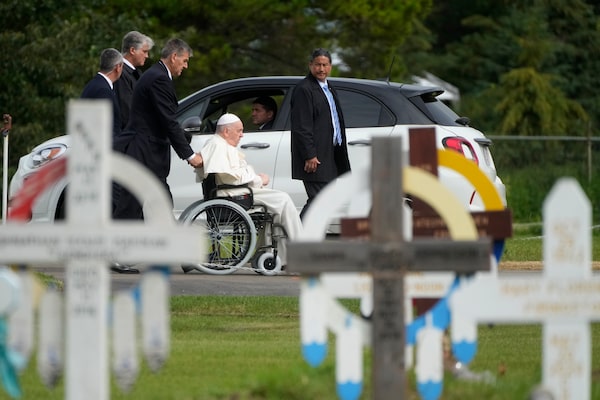
Pope Francis leaves after praying in a cemetery at the former residential school in Maskwacis. Pope Francis begins a "penitential" visit to Canada to beg forgiveness from survivors of the country's residential schools.Gregorio Borgia/The Associated Press
Pope Francis’s stop at the cemetery is being streamed on two large screens at the powwow grounds. Part of the crowd is watching the screens beside the stage and part is looking toward the back, where chiefs have assembled for the grand entry.
Pope Francis prays at a gravesite at the Ermineskin Cree Nation Cemetery in Maskwacis, Alta., during his papal visit across Canada on Monday, July 25, 2022. THE CANADIAN PRESS/Nathan DenetteNathan Denette/The Canadian Press
A helicopter and drone hover overhead. People are still chatting at Maskwa Park, but it has quieted down as the Pope arrives now by wheelchair, with his entourage behind him.
– Carrie Tait
11:30 a.m. ET
Residential school survivors, their families arrive for Pope’s visit
‘I’m here mainly to accept the apology on behalf of my mom and dad’
Alma Favel King travelled from Poundmaker Cree Nation in Saskatchewan for Pope Francis’s visit to Maskwacis. She attended residential school in Onion Lake, Sask. Her parents and grandparents also attended residential school.
“I’m here mainly to accept the apology on behalf of my mom and dad. And all those who aren’t able to be here,” she said as the crowd waited for the Pope to arrive. “I think it means that the church recognizes the harm that they caused our people. And hopefully this can be a new relationship between the First Nations and the church.”
Her mother, Ms. Favel King said, would have attended if she were alive.
Ms. Favel King, 74, said she suffered advanced scabies at residential school and ended up in the hospital. Her parents refused to return her and her sister to the institution, and the priest sent her family “nasty letters” in response.
The day, she said, is “overwhelming.”
– Carrie Tait
‘(I)t does mean something that he came to a First Nation to make his apology.’
David Gamble, Grand Chief of the Sask First Nations Veterans Association, has little hope that Pope Francis’s apology Monday will build on the one he made in April.
“He is saying sorry for something that he was not involved in,” he told The Globe and Mail. “… But it does mean something that he came to a First Nation to make his apology.”
Mr. Gamble, 55, says his father and his uncles were residential school survivors, and that his uncles experienced “awful sexual and mental abuse.” They resorted to alcohol and drugs to try to find solace, and some of their children got caught up in that cycle. “I lost two uncles to alcohol and I was a big alcoholic myself,” he said.
When asked whether there was anything the Catholic Church could say or do that would help repair the damage done, he replied: “What the Church can do for me is stay away from me.”
– Eric Reguly
10:30 a.m. ET
Thousands arrive in Maskwacis for Pope’s visit
Thousands of people have arrived at Maskwacis in advance of the Pope’s arrival later this morning, taking seats in lines of white chairs that have been set up. Videos are playing recorded messages from the Pope and clips of people talking about the effort that led to this visit. There is a large contingent of media from around the world. A light rain fills the air with the smell of prairie grasses.
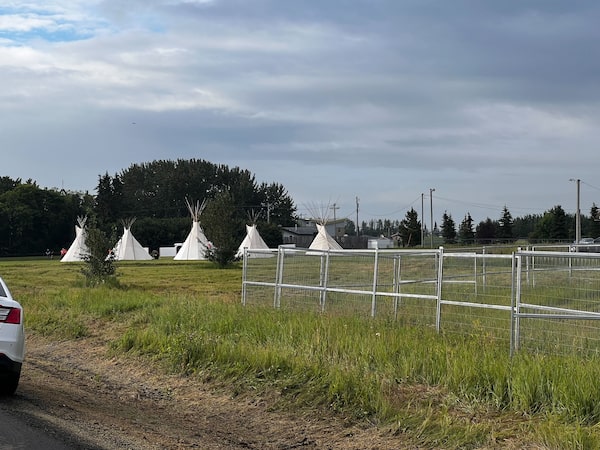
Tipis mark the site of the former Ermineskin Indian Residential School. The cemetery, which Pope Francis will visit, is behind this site.Jana G. Pruden
Mascwacis, formerly called Hobbema, was the site of the Ermineskin Residential School. One of the largest in Canada, it operated from 1916 to 1975. Five tipis now mark the site, four of them representing each of the nations of this land – Samson Cree Nation, Ermineskin Cree Nation, Montana First Nation and the Louis Bull Tribe – and the fifth symbolizing the entrance to the school that once stood.
– Jana Pruden and Carrie Tait
8:00 a.m. ET
First full day of the Pope’s visit to Canada
Thousands of residential and day school survivors and their families from across Canada will gather today in Maskwacis, Alta., to meet with Pope Francis. The Pope landed in Alberta on Sunday for a six-day visit to address the devastating legacy of the country’s residential school system.
He begins in the Edmonton area before heading to Quebec City and Iqaluit, where he will meet with Indigenous survivors, knowledge keepers, youth, elders and leaders, along with leaders in the Catholic Church.
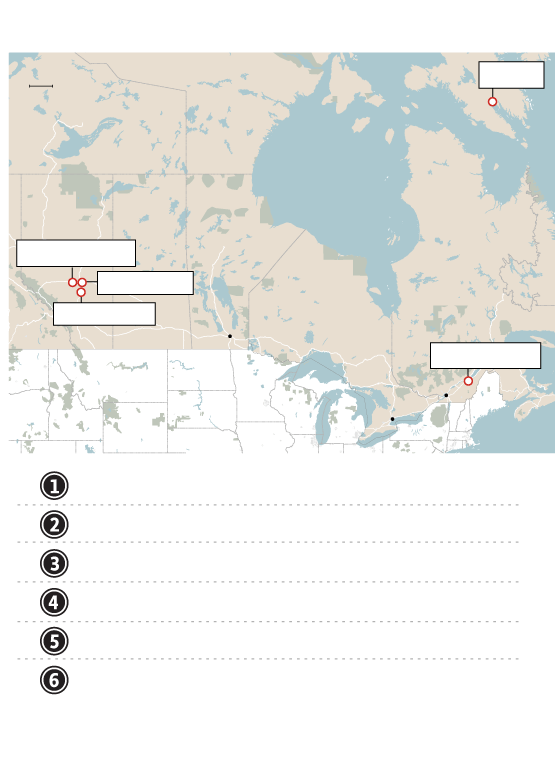
Where the Pope will be on visit to Canada
Iqaluit
0
150
KM
NWT
NUN.
Hudson
Bay
ALTA.
MAN.
SASK.
Lac Ste. Anne
NFLD.
Edmonton
QUE.
Maskwacis
ONT.
Winnipeg
Quebec City
UNITED STATES
Montreal
Toronto
Sun., July 24: Depart Rome; arrive Edmonton
Mon., July 25: Edmonton; Maskwacis
Tues., July 26: Edmonton; Lac Ste. Anne
Wed., July 27: Depart Edmonton; arrive Quebec City
Thurs., July 28: Quebec City
Fri., July 29: Depart Quebec City; arrive Iqaluit; Rome
THE GLOBE AND MAIL, SOURCE: TILEZEN; OPENSTREETMAP
CONTRIBUTORS; Bulletin of the Holy See Press Office
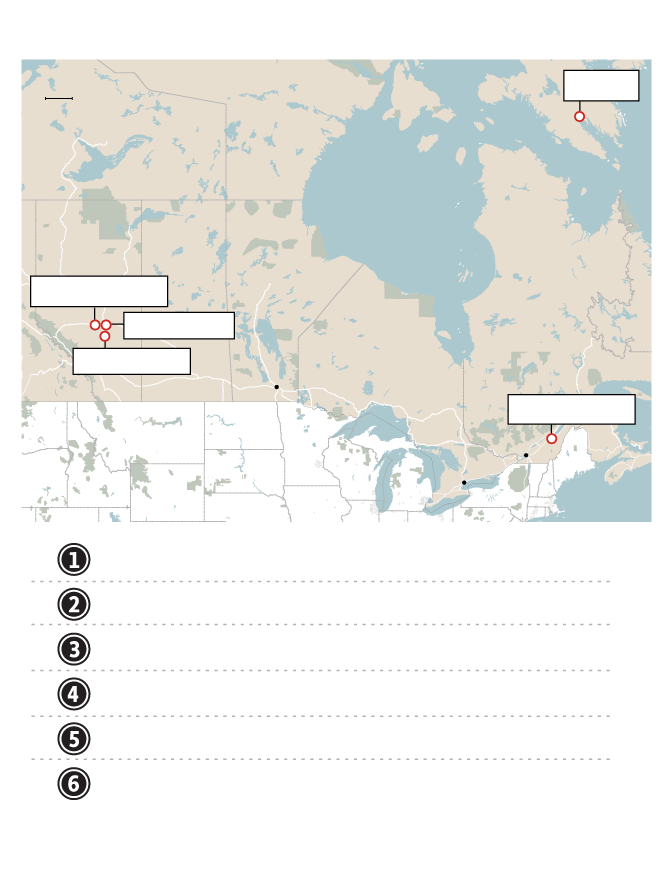
Where the Pope will be on visit to Canada
Iqaluit
0
150
KM
NWT
NUN.
Hudson
Bay
ALTA.
MAN.
SASK.
Lac Ste. Anne
NFLD.
Edmonton
QUE.
Maskwacis
ONT.
Winnipeg
Quebec City
UNITED STATES
Montreal
Toronto
Sun., July 24: Depart Rome; arrive Edmonton
Mon., July 25: Edmonton; Maskwacis
Tues., July 26: Edmonton; Lac Ste. Anne
Wed., July 27: Depart Edmonton; arrive Quebec City
Thurs., July 28: Quebec City
Fri., July 29: Depart Quebec City; arrive Iqaluit; Rome
THE GLOBE AND MAIL, SOURCE: TILEZEN; OPENSTREETMAP
CONTRIBUTORS; Bulletin of the Holy See Press Office

Where the Pope will be on visit to Canada
Sun., July 24: Depart Rome; arrive Edmonton
Iqaluit
Mon., July 25: Edmonton; Maskwacis
Tues., July 26: Edmonton; Lac Ste. Anne
Wed., July 27: Depart Edmonton; arrive Quebec City
Thurs., July 28: Quebec City
Fri., July 29: Depart Quebec City; arrive Iqaluit; Rome
Hudson
Bay
ALTA.
SASK.
MAN.
Lac Ste. Anne
NFLD.
Edmonton
QUE.
Maskwacis
ONT.
Winnipeg
CANADA
UNITED STATES
Quebec City
PEI
N.B.
Ottawa
Montreal
N.S.
Toronto
0
150
KM
THE GLOBE AND MAIL, SOURCE: TILEZEN; OPENSTREETMAP CONTRIBUTORS; Bulletin of the Holy See
Press Office
Today he will travel south of Edmonton to visit Maskwacis, home of the former Ermineskin Residential School site – one of the largest such sites in Canada. He is expected to stop and offer a prayer before heading to an event at Makwa Park (for 10 a.m. MDT), where he is then expected to deliver an apology for the intergenerational harms from the church-run, government-funded schools.
Later today (at 4:45 p.m. MDT) he will meet with Indigenous people and the parish community of Sacred Heart Church of the First Peoples, a national Indigenous church in Edmonton, in an invitation-only event. This is the first papal visit to Canada in 20 years; it has the theme of “Walking Together,” and will focus on healing and reconciliation with Indigenous peoples.
Sunday, July 24
Pope Francis arrives in Canada
Pope Francis kissed the hand of Elder Alma Desjarlais, a residential school survivor, and received a beaded medallion as a gift from Grand Chief Arcand.GUGLIELMO MANGIAPANE/Reuters
Pope Francis touched down in Alberta just after 11 a.m. on Sunday, after making the 10-hour flight to Edmonton from Rome for a historic Canadian visit. He was met by Prime Minister Justin Trudeau and Mary Simon, Canada’s first Indigenous Governor-General, for a brief ceremony and greeting.
Flanked by Mr. Trudeau and Ms. Simon, in a trio of chairs on a thin red carpet, Pope Francis shared private words with a procession of local and national political, Indigenous and church leaders. He kissed the hand of Elder Alma Desjarlais, a residential school survivor, and received a beaded medallion as a gift from Grand Chief George Arcand. The Pope passed out gifts of coin medallions in small red boxes to those he met.
How the Vatican encouraged the colonization of Indigenous lands – and enabled the Crown to keep them
He has described the trip as a “penitential pilgrimage,” intended to foster healing and reconciliation in the wake of a legacy of physical, sexual and emotional abuse suffered by Indigenous children at Catholic-run residential schools.
This is Pope Francis’s first visit to Canada, and only the fourth papal visit in Canadian history.
– Jana Pruden and Eric Reguly








